Martin Edwards's Blog, page 57
June 10, 2022
Forgotten Book - Death of a Stray Cat
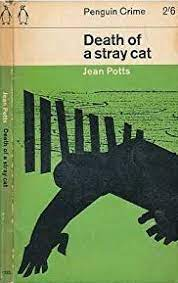
Considering that her first novel won an Edgar and that she had a productive career yielding fourteen novels (plus a number of very good short stories) over a period of twenty-one years, it seems odd that Jean Potts disappeared from the radar of crime fans until quite recently. Stark House Press have done a good job in republishing several of her novels, and I have a number of her books in green Penguin editions which once belonged to Bob Barnard. I think she is a first-rate crime writer.
Death of a Stray Cat, published near the start of her career in 1955, is a good example of her work, if more akin to a conventional whodunit than other titles. Potts' sharp characterisation and way with words are great strengths, and the plot is pretty good too. Marcella Ewing is murdered in the first chapter and it soon becomes clear that she was a born victim. Her character flaws are presented unsentimentally, yet with an underlying compassion.
Marcella was a reasonably attractive young woman but her lovers tended to tire of her. It seems likely that one of them was responsible for her death. Might it have been Alex, married to Gen? Or her ex-husband, Jimmy? Or Walt? Or Brad? Or Dwight? Or...well, you get the idea. Motives and suspects abound. A likeable cop called Ed investigates, while Gen - shocked by the discovery of Alex's brief affair with Marcella - does some sleuthing of her own.
Potts shifts viewpoints rapidly in this novel and this helps her to maintain the momentum of the story, although it does mean that readers may be unsure where their sympathies lie. Francis Iles felt this book was better than her Edgar winner, Go, Lovely Rose, which he regarded as over-rated, but thought that there were some improbabilities in the plot. Maybe so, but because Potts cares about her characters, I found that I did, too. A really good book by a writer who deserves to be better-known.
June 8, 2022
The Best Mystery Stories of the Year 2022
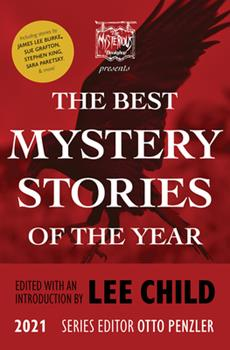
I first came across the name of Michele Slung more years ago than either she or I would probably care to remember, when her notable anthology Crime on Her Mind was published as a Penguin paperback in the UK. It was an admirable selection of classic crime stories featuring female detectives. There have been many such collections over the years - I've often thought of putting one together myself - but her book is the leader of the pack.
I mention Michele because she is working with the legendary Otto Penzler, for The Best Mystery Stories of the Year 2022, for which the guest editor will be Sara Paretsky. This is primarily an American publication, but stories from authors based elsewhere are, these days, eligible for possible inclusion. For example, my own 'The Locked Cabin' appeared in last year's collection, edited by Lee Child in conjunction with Otto - the cover image is above this post. Michele's role is to 'screen' the stories, which involves a huge amount of reading each year.
So the authors among you may wish to consider submitting your stories - provided they are original to 2022. No dusting down old material, then, however great it is! The other thing you have to bear in mind is that the stories have to be submitted as printed copies, not as email attachments or in some other non-print format.
If you're tempted, send your story to:
Otto Penzler
BEST MYSTERY STORIES OF THE YEAR
58 Warren Street
New York 10007
United States of America
June 6, 2022
Reviews and the Blog Tour for The Life of Crime

For me, it's been an exciting few days, as I have had the double pleasure of enjoying reviews of The Life of Crime while anticipating the US publication tomorrow of The Girl They All Forgot (aka The Crooked Shore). Today I want to express my appreciation of the reviewers who have given The Life of Crime such a wonderful start. So wonderful, in fact, that on Friday evening, the book became an Amazon #1 bestseller in the literary reference category. Given that it's not exactly a cheap book, this was a delightful surprise.
There was a truly fantastic review in the 'i' newspaper from Moira Redmond. Not only that: Moira also took part in the blog tour and contributed a lovely piece that made me blush: not such a common occurrence. And the word cloud image above (which relates to chapter 35 of the book) comes from an incredible review by Kate Jackson. I should say that, because of production hold-ups, reviewers had very little time to devour the book, which given its length meant that reviewing became quite a challenge. But Kate rose to it in the most remarkable way. I don't think I've ever seen any review of a book about the genre which tackles the material at such length, not to mention in such depth and with such thought. It must have taken ages to put together and I'm quite blown away by it. The word clouds relating to each chapter topic really were the icing on the cake.
I loved Jim Noy's review at The Invisible Event, not least the closing words: 'Anyone who thinks they're going to follow this in another 50 years has my sympathies.' There were also great reviews from Puzzle Doctor, Basil Ransome-Davies at Shiny New Books, Desperate Reader Northern Reader and Vicky Lord to go along with those by Christine Poulson and Andrew Taylor in The Spectator which I've mentioned previously. And just in case there was anything about the background to the book that you were afraid to ask, I've written an article on CrimeReads which discusses some of its genesis...
June 3, 2022
Forgotten Book - Too Many Bottles
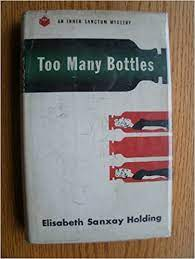
I share with Raymond Chandler and Ed Gorman, among others, an admiration for the work of Elisabeth Sanxay Holding, a crime novelist who has long been under-rated. Domestic suspense was her forte and it's at the heart of Too Many Bottles, published in 1951, towards the end of her career. This is a swift read, a short book that ranks as a minor work compared to her best novels, but not without interest (yes, I know that's damning with faint praise, but I think it's a fair summary).
We see things from the point of view of a youngish man called Brophy. He writes pulp fiction and for the past year he's been living with his new wife Lulu and her sister Norma. Lulu is good-looking and possesses a superficial charm, but she's also nervy and needy and Brophy isn't in love with her. The Brophys hold a party which goes badly and after it's over, Lulu is found dead. At first it seems as if she may have consumed a poison by mistake, but it soon becomes clear she was murdered.
Holding piles on a number of complications, and in due course there is another death. However, I formed an opinion about what was going on during the early chapters and I was disappointed to find that I was right. The mystery isn't as complex as it might have been, and Brophy's denseness becomes rather irritating.
Yet there are some nice touches, especially during a conversation about the merits, or otherwise, of creative writing classes and in Brophy's ruminations about his own crime writing. And I did enjoy the ironic passage where Brophy thinks: 'I couldn't write a psychological novel. I wouldn't know how to motivate my people. I'm too healthy. Or maybe too dumb.'
May 31, 2022
Joseph Raz 1939-2022
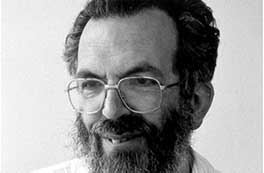
I was so sorry to learn of the recent death of Jo Raz, who has just been described in an obituary from Oxford University's Faculty of Philosophy as 'one of the three or four leading legal philosophers of the last hundred years'. High praise, but I doubt that anyone who knew him would disagree. Certainly not me. I had the enormous privilege to be one of his pupils during my three years as an undergraduate and I've said plenty of times over the years that in pure intellectual terms, he had the most brilliant mind I've ever encountered.
I first met Jo when he, Don Harris and Paul Davies interviewed me for a place at Balliol College, while I was still at school. I was an introverted teenager from a very ordinary background; nobody in the family had been to university. I remember feeling nervous and intimidated, so much so that a terrible feeling of sickness had overwhelmed me as I arrived at Oxford Station, a scary experience I've never forgotten. When the three dons started firing questions about legal concepts at me, I struggled to handle them. Luckily the conversation turned to Burt Bacharach (whom I'd written about in my entrance exam - my cunning plan had been to demonstrate my embryonic advocacy skills, presenting a case for the century's greatest composer!) and although I doubt that Jo, in particular, was a Burt fan, everything went swimmingly from that point. Over the next three years I gained a great deal from being taught by three very different, but remarkably able and pleasant tutors.
As the obituaries have mentioned, Jo was famously severe in those days if he detected any hint of intellectual sloppiness, but that was simply because he had exceptionally high standards, something I admire in any field. He realised that people like me weren't on the same level and by challenging me to think more deeply instead of relying on 'skimming over the surface of things', as he put it, he got the best out of me. My results in Finals were probably better than my actual intellectual skills merited and I think that was to some extent due to my feeling driven on by Jo. On a personal level, he was a very nice man and I liked him a lot.
He and I talked several times about my burning ambition to become a novelist. He encouraged me and said kind things about my writing style, remarks which I treasured, but he also encouraged me to take advantage of everything else Oxford had to offer a student - the plays, the lectures on other subjects and so on. I took his advice whenever I could, and I never regretted it.
After hearing of his death, I watched this tribute documentary to Jo, made a few years ago when he won a major prize. Imagine my shock and delight when, as I watched, a photo of a post-Finals champagne party featuring me and the future Mrs Edwards on the same row as Jo came on to the screen (at 28:57). Incredible!
Jo Raz's legacy is in part his ground-breaking books (not an easy read for ordinary mortals - I confess that I never got to the end of Concept of a Legal System!) but in large measure the fact that he made a huge impression on a vast number of students. I never made it as a legal philosopher, but I'm proud to be among them.
May 30, 2022
Denis Kendal and Mary Kelly

Life is hectic, in a good way, right now, thanks to a combination of promotional activities connected with The Life of Crime and two or three current writing projects. But I did want to take a quick break to mention a bit of sad news, in that I've learned that Denis Kendal has died. Denis, as I've mentioned on this blog before, was the widower of Mary Kelly, Gold Dagger winning author of The Spoilt Kill. Here is a set of photos of Mary which Denis sent to me - I don't think they have been published before.
I never met Denis in person, but we chatted on the phone and corrresponded extensively during the past few years. I found his recollections about Mary's writing career fascinating (and yes, she is referenced in The Life of Crime). I also greatly admired, not just his devotion to preserving her memory, but also his determination to overcome the problem of limited vision, which must have been a great restriction and source of distress. But he triumphed over it.
Of all the good things associated with the British Library's Crime Classics series, one that I'm especially happy about is the revival of Mary's reputation. We've managed to introduce her to a new generation of fans, with three titles, each of them entirely distinct: The Christmas Egg, The Spoilt Kill, and Due to a Death. She never wrote to a template, and I find that admirable, although it helps to explain why her career at the pinnacle of British crime writing didn't continue for as long as those of many of her contemporaries.
With Denis's support, I was able to include a contribution from Mary in the Detection Club's masterclass on crime writing, Howdunit. My article about Mary's life and work for CADS is, I think, the most comprehensive that has appeared, and I couldn't have written it without Denis' s help and encouragement. He was thrilled to see his wife's books recognised again and I was thrilled for him. He died on 5 April at the age of 93 and I shall remember him with a good deal of affection.
May 27, 2022
Forgotten Book - Doctor Syn
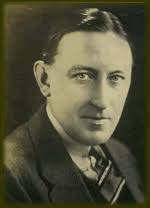
Seeing your first novel for the first time, holding the reality of it in your hand, is a special moment. So spare a thought for Russell Thorndike, back in 1915, when he received his copy of his debut, Doctor Syn. On the front cover, spine, and title page, his surname was spelled Thorndyke, as if he were connected to Austin Freeman's great detective. It must have been an excruciating experience, though I understand that the book was popular enough to earn an early reprint, and the error was then corrected. (Thorndike, pictured, was wounded in the Gallipoli campaign, so I wonder if some time passed before he laid his hands on his novel - if so, it probably didn't help his recovery to full health, but the good news is that he did live until the ripe old age of 87).
The sub-title is A Tale of the Romney Marsh. It's a historical story, set in the late 18th century, and to do with smugglers. Not my usual sort of thing, to be honest. However, I was attracted by the chance of seeing a first edition which featured an inscription to Charles B. Gilbert - 'here's to the feet that have walked the plank'. It turns out that this is a quote from a smugglers' drinking song which features more than once in the story.
My interest in the book was quickened by visits to Dymchurch and Romney Marsh after taking part in a couple of Rye Festivals. The Marsh is a fascinating part of Kent, previously unknown to me, flat (as you'd expect) yet certainly not lacking in character or atmosphere. I felt sufficiently intrigued to consider using it as a setting, either for a short story or perhaps scenes in a Rachel Savernake novel. Right now, the latter is quite a likely option.
What of the story? Well, it's a readable yarn, and the spookiness of the Marsh is well conveyed and places an important part in the story. Even though it's not the sort of book I'd usually read, I can understand why it became a success - so much so that it gave rise to three films a whole raft of prequels. Thorndike, who like his more famous sister Sybil had started out as an actor, focused increasingly on authorship and he was also involved with Six Against the Scotland Yard, perhaps his closest brush with conventional mystery fiction.
May 26, 2022
Publication Day - The Life of Crime

When you've been working on an idea, and then a book, for as long as I've been working on The Life of Crime, it seems almost surreal when the moment of official publication finally comes along. But today is the day! And as from today there is a blog tour - my sincere thanks to the ten bloggers taking part. The first reaction on the tour comes from Christine Poulson and her comments are truly gratifying.

Thanks to Gary Stratmann, I have some photos of the champagne do during CrimeFest when the book was celebrated in the company of Simon Brett, Felix Francis, Cath Staincliffe, Michael Ridpath, Robert Goddard and various other friends. I've also had cause to celebrate with a coveted starred review from Publishers' Weekly in the US: 'magisterial...unlike other major studies of the genre, gives plenty of space to non-Anglo authors and writers of color. The result is an encyclopedic and consequential volume, a must-read for readers who've wondered who-, how-, or whydunit.'
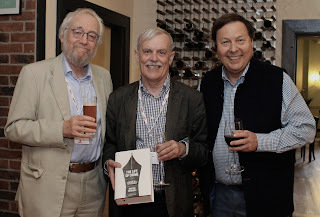
And then this morning came news of a fantastic review in the Spectator by that fine novelist Andrew Taylor: 'magisterial but wickedly entertaining...a long book, but it's reliably readable and frequently amusing. It also inspires awe: Edwards combines wide reading with a good memory, meticulous control over his unruly material, critical acumen and sheer bloody persistence.' Wonderful!
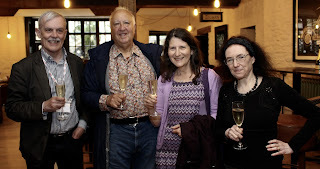
The book contains extensive acknowledgements, but I'd like to take a moment right now to thank those experts who gave generously of their time when commenting on partial drafts of the manuscript during the past few years. Nigel Moss, wise and meticulous, spent a great deal of time checking and commenting, while others who made a particularly special contribution by giving me the benefit of their expertise included Doug Greene, Steve Powell, Victoria Stewart, David Bordwell, Art Scott, Joseph Goodrich, Rick Ollerman, John Pugmire, and Mauro Boncampagni.
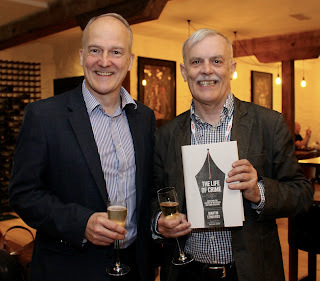

Of course I'm grateful to my agent James Wills and to David Brawn and his colleagues at Harper Collins who helped to make my vision a reality. John Garth the indexer, did a terrific job - this is a book that definitely needed a really good index, and John compiled three, which take up nearly eighty pages. A word of thanks also to the cover designer, Steve Leard, whose contribution to my books I discuss in this piece for Shots. In this essay for Crime Time I discuss some of the other people whose writing about the genre I admire.
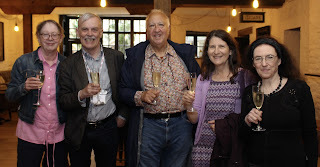
So for me this is a happy and memorable occasion. And tonight, there might just be some more quaffing of champagne...
May 24, 2022
Birnam Book Festival

I'm back home after spending a wonderful long weekend in Scotland, taking part in the Birnam Book Festival. Yes, that's Birnam of Macbeth fame, a tiny village which together with Dunkeld, on the other side of the River Tay, is home to about 1500 souls but has more to offer than some places ten times the size. Including the legendary Birnam Oak (pictured above), close to the river and Birnam Hill, looming over the village. There's a strong sense of community about the place and the venue for the festival events is an extremely impressive arts centre which adjoins a Beatrix Potter garden (Beatrix loved the neighbourhood, and it's easy to see why). The village even has its own very pleasant bookshop, The Birnam Reader which also serves coffee and cake and is definitely worth a visit if you're in the area.


My event was a conversation about Lives of Crime, expertly chaired by bestselling novelist Fiona Valpy, who talked to myself and Scottish crime novelist (and true crime writer) Douglas Skelton. Douglas and I had never met before, but the session proved highly enjoyable and an hour and a half whizzed by. Other highlights were an opening reception at an art gallery and studio whose delightful proprietor was previously one of Scotland's few women police officers of Asian heritage. She's also an extremely good artist.

We were lucky to be able to stay at Dunaird Cottage, in the grounds of the turreted home of Scott and Nicky Herbertson. If you fancy a trip to the gateway to the Highlands, this is an ideal base, and we were able to explore locally (the Hermitage and Ossian's House, a great walk) and a bit further afield - the Scone Palace (full of history) and Blairgowrie. I also loved having the chance to examine at close quarters Scott's wonderful collection of crime novels as well as the books for sale through his Hadwebutknown book dealership.


I've often made the point that organisers of festivals work very hard to make their events a success and certainly the Birnam team deserve a great deal of congratulation. It's never an easy task, but as we emerge from lockdown life, it's even more challenging. Suffice to say that everyone rose to the challenge admirably. And from a personal point of view, I was thrilled to discover after my event was over that Manchester City had risen to the challenge of winning the Premier League for a fourth time in five years. That really put the icing on the cake!


May 23, 2022
10 Cloverfield Lane - 2016 film review
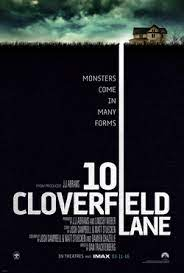
10 Cloverfield Lane is a movie that is loosely connected to Cloverfield, which I not long after its original release. To describe it as a sequel would, however, be too much of a stretch. I gather that the storyline was originally conceived quite independently of Cloverfield, though there are connections in the version that reached the screen. I must say, however, that I felt it was the superior movie. In fact, it's one of the most striking scary films that I've seen in a long while.
Scary movies are, all too often, either not very scary at all, or exploitative and perhaps simply unpleasant. 10 Cloverfield Lane, on the other hand, is cleverly written, so that you never quite know what is going to happen next. I don't want to go into too much detail, since I don't want to spoil your viewing pleasure, but I think the screenplay marries two distinct types of story very effectively.
Michelle (Mary Elizabeth Winstead) is involved in a sickening car crash and wakes up to find herself manacled and confined to a basement. It seems that she is the captive of an apparently rather gross older man called Howard (John Goodman) and before long she discovers that they are not alone. Also in the basement is a young man called Emmett (John Gallagher). So far, so predictable, you may think. But you'd be wrong. Very soon, it starts to look as though the basement may be the safest place to be...
The excellent performances of Winstead and Goodman in particular make the most of the material. I was gripped from start to finish. The ending of the film has provoked some debate, and apparently some viewers don't care for it. However, I think it's very well-judged. This is a genuinely thrilling movie which for once doesn't skimp on characterisation. Yes, I was impressed.



